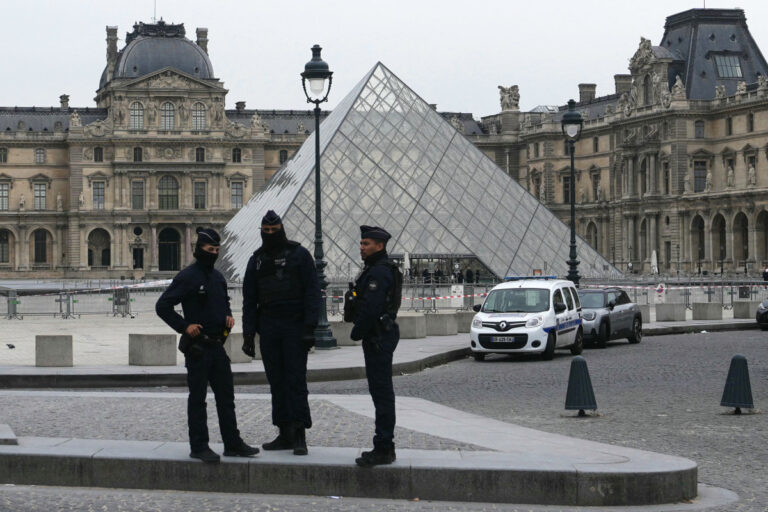Some people are good at asking you questions about yourself. Haley Lu Richardson is; Portia, the character she plays on HBO’s White Lotus, isn’t.
Within ten minutes of sitting down across from me in a busy hotel restaurant in New York, Richardson asks me about my earrings, advice about Instagram (she’s losing followers), and whether I like mushrooms. The latter is referring to the pizza type we’re trying to pick, and when I respond “Yeah” less than enthusiastically, she quickly rebuts “No you don’t,” and we laugh because she’s right.
“I’m a very emotionally intelligent person. I can pick up on these things,” she explains.
Unlike Portia – the depressed 20-something-year-old assistant dragged along to Sicily with her boss Tanya McQuoid (Jennifer Coolidge) in the hit series’s second season — Richardson is earnest and engaged, eager to make conversation and not focus on herself. When asked about working on the show, she gives off an aura of "I’m just happy to be here" but she’s not clueless either. She knows the internet is not Portia’s biggest fan, though she didn’t expect people would dislike her as much as they did. “I try not to think about what people are going to think of what I’m doing. You don’t really expect anything that’s gonna happen,” she says.
She could just as easily be talking about where Portia ends up in the Season 2 finale. In a scenario right out of a horror film, Portia ultimately realizes that she has been kidnapped by her hot British beau Jack (Leo Woodall.) Her way of handling that has been met with just as much backlash as everything else she’s done this season. Instead of immediately running away or contacting Tanya as soon as she starts to suspect trouble is near, she is unsurprisingly passive—though maybe because she’s justifiably scared. Who wouldn’t be? Especially after realizing that Tanya’s ex-husband Greg hired hit men to murder her so he could escape their prenup and become her financial beneficiary.
“With what I know about Portia, she was doing her best,” explains Richardson. “The fact that she was making these decisions in real time, I didn’t expect her to all of a sudden have great instincts and be a hero.” Her best, as it turns out, is not enough, and the consequences are tragic: Tanya dies (though she does get revenge in the minutes before her unexpected and “derpy” demise) and viewers realize that Portia did not go back to the hotel to try to save her.

Fabio Lovino/HBO
Portia’s character spends the season’s first episode complaining about being “stuck in Sicily,” and the internet was quick to dismiss her Gen-Z work ethic. Viewers were also quick to jump on her fashion choices. As Harper’s BAZAAR fashion news director Rachel Tashjian described the costuming in a (positive) piece, “She does not dress like a character from Euphoria; she dresses like a lost young woman who watches Euphoria.”
As Tashjian points out, Portia’s chaotic wardrobe is merely an extension of what she represents as a character. Richardson continues to defend her: “I know people are shitting on her outfits, but I think the freedom of self-expression is so beautiful.” When it comes to her own fashion sense, Richardson isn’t constrained or driven by the discourse. Instead she’s nonchalant when she talks about her style in real life, describing her closet as a “smorgasbord.” She’d prefer not to put a name to the way she dresses everyday, since she “likes dressing how [she] feels and that change is constant.” Like Portia, she’s had some outfits she regrets. Her most recent was an E-girl phase.
As someone who didn’t personally hate Portia’s wardrobe, I ask Richardson if there was anything she wanted to take. “No,” she says quickly, though she did like the matching House of Sunny set from the sixth episode. “I did take something small though, but I didn’t ask. I just took it,” she says, giggling. (In order to avoid any hard feelings from the person she took it from, she refuses to tell me what it was.)
Richardson describes Portia as lost, self-absorbed, and depressed, but when I share the attributes I like about Portia, she says “I love that you’re a Portia defender,” and I can tell she is too. It’s less of a matter of whether we like her or not, but that we understand her. Richardson says, “I have so much empathy for Portia, and I did the whole time playing her. When you’re that stuck, nothing is gonna make you happy. Absolutely nothing.”

Stefano Delia/HBO
While there were some real life influences that Richardson brought to Portia, she felt that the character rubbed off on her more than anything.
“Portia brought out things in me that I didn’t realize were so intense,” she says. “ [She’s constantly] wanting more and [looks] outward for fulfillment, [and] since playing her, I’ve never been more hungry to feel fulfilled with inspiration and creativity and projects. I feel that so deeply, in a way that almost makes me miserable.”
This deep unhappiness, which so many found infuriating, is the center of who Portia is, or at least who she is at this very moment in time. While it may have been insufferable, it also highlights a Gen-Z stereotype that has some truth to it. “The people that are made so uncomfortable by that quality in Portia: it’s so annoying. I bet they share a bit of that with her and they just don’t want to admit it,” says Richardson.
At 27 years old, Richardson is on the cusp of two generations. Sitting in between being a Gen Z and millennial, she is adamant that Portia is going through something specific to her age-group, especially in regards to social media “There’s that struggle to find fulfillment when your expectations of the world are created by the time you spend on these apps. It can make you look at what you are doing and feel like a pile of shit,” she says.
View full post on Instagram
And Richardson can’t help but defend her openness. “Portia doesn’t wholeheartedly represent this because she’s not at a great place in her life, but she is so open with being messy and chaotic, and that’s something that actually is a good thing. I think people try to suppress that and keep themselves in this perfectly put-together box, which can lead to other kinds of struggles. And Portia is just unapologetically a chaotic mess.” There’s beauty in Richardson’s acceptance of that.
As for what else she’s taking from Portia, Richardson is still figuring it out. She knows that you’re upset about how Portia handled the finale (because who was truly ready to say goodbye to Jennifer Coolidge?), but in the end, she’s made her peace with the character: “As someone who got to understand her and play her, I can see that she’s at this transitional part of her life, for better or for worse,” says the actress.“I still don’t know what it is at the end of all of this, but the severity of how this trip ended for her, and how she chooses to be affected by that moving forward, is really going to shape the person she ends up being.”







